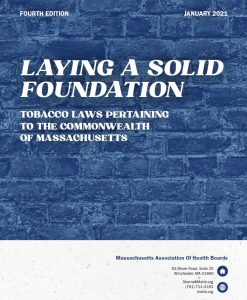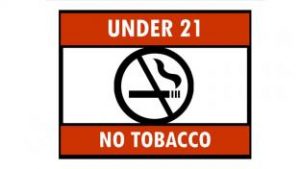 Acknowledgements: Laying a Solid Foundation was originally drafted by staff at the Public Health Advocacy Institute (formerly known as the Tobacco Control Resource Center), based at Northeastern University School of Law for the Massachusetts Department of Public Health’s Tobacco Cessation and Prevention Program. Contributing authors of this current edition are Cheryl Sbarra, J.D., Massachusetts Association of Health Boards, D.J. Wilson, J.D., Massachusetts Municipal Association, Chris Banthin, J.D., Public Health Advocacy Institute at Northeastern University School of Law, and Sarah McColgan, Massachusetts Health Officers Association. This edition has been significantly edited to include new state and federal laws relative to tobacco. This booklet is intended for educational purposes only and should not be construed as legal advice.
Acknowledgements: Laying a Solid Foundation was originally drafted by staff at the Public Health Advocacy Institute (formerly known as the Tobacco Control Resource Center), based at Northeastern University School of Law for the Massachusetts Department of Public Health’s Tobacco Cessation and Prevention Program. Contributing authors of this current edition are Cheryl Sbarra, J.D., Massachusetts Association of Health Boards, D.J. Wilson, J.D., Massachusetts Municipal Association, Chris Banthin, J.D., Public Health Advocacy Institute at Northeastern University School of Law, and Sarah McColgan, Massachusetts Health Officers Association. This edition has been significantly edited to include new state and federal laws relative to tobacco. This booklet is intended for educational purposes only and should not be construed as legal advice.
This booklet is designed to introduce public health professionals and other interested individuals to state and federal tobacco-related laws affecting Massachusetts, as well as provisions from the 1998 Master Settlement Agreement between most states’ Attorneys General and the vast majority of tobacco companies. In Massachusetts, local board of health regulations, town by-laws and city ordinances can address tobacco-related issues.
These local laws play a substantial role in protecting the public from the dangerous effects of tobacco. Federal and state tobacco-related laws usually set minimum standards. In general, cities and towns can enact stricter tobacco-related laws. This booklet addresses local legal authority to regulate tobacco sale and use. It also includes checklists for
regulating tobacco sale and use locally, and emerging tobacco-related issues. In light of the above, when seeking information on tobacco-related laws, it is important to learn the status of local
tobacco-related laws in a specific city or town. These laws are usually available on municipal websites, in city and town clerks’ offices, and at local boards of health. They are frequently stricter than federal and state laws and act in concert with them.
